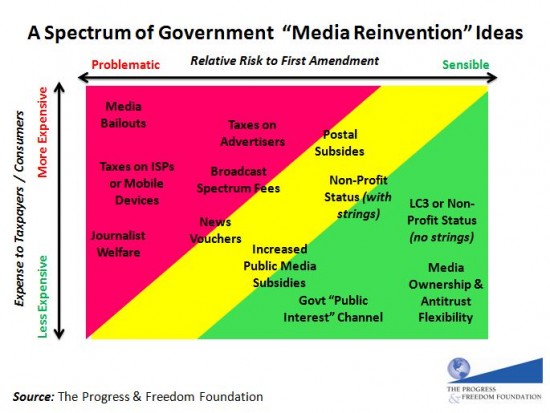In his syndicated column yesterday, Leonard Pitts, Jr. bemoaned the decision by the New Orleans Times-Picayune to cut back its print edition to three days a week, and attacked the sentiment, most recently expressed by former Alaska Gov. Sarah Palin, who might herself been quoting Matt Drudge, that the Internet allows “every citizen to be a reporter and take on the powers that be.”
Pitts immediately attacks the comment on the basis of its source, Palin. Then he wanders further from the point by conjuring the truly unpleasant conditions under which reporters, Picayune staffers no doubt among them, labored to ensure news got out in the weeks following Hurricane Katrina’s devastation of the Gulf Coast.
One night I had the distinct honor of sleeping in an RV in the parking lot of the Sun Herald in Gulfport, Miss., part of an army of journalists who had descended on the beleaguered city to help its reporters get this story told. The locals wore donated clothes and subsisted on snack food. They worked from a broken building in a broken city where the rotten egg smell of natural gas lingered in the air and homes had been reduced to debris fields, to produce their paper. Shattered, cut off from the rest of the world, people in the Biloxi-Gulfport region received those jerry-rigged newspapers, those bulletins from the outside world, the way a starving man receives food.
Yet nothing in this rather self-important prose tells us what’s so irreplaceable about printed newspapers as a platform for news delivery. Instead, we get a straw man.
Palin’s sin–and she is hardly alone in this–is to consider professional reporters easily replaceable by so-called citizen journalists like Drudge. Granted, bloggers occasionally originate news. Still, I can’t envision Matt Drudge standing his ground in a flooded city to report and inform.
One can say the same thing about Bill Maher, Keith Olbermann or Wolf Blitzer. Yet, come the next disaster, there’s no reason not to expect the same dedication from a handful of individuals who are driven to place themselves in the middle of an adverse, if not outright dangerous, event just to document first-hand what is happening. Only this time they have the cheap video cameras, battery operated laptops and cellphones with wireless Internet connections. The news will get out.
Continue reading →



 The Technology Liberation Front is the tech policy blog dedicated to keeping politicians' hands off the 'net and everything else related to technology.
The Technology Liberation Front is the tech policy blog dedicated to keeping politicians' hands off the 'net and everything else related to technology.
List of Major Comments in FCC “Future of Media” Proceeding
by Adam Thierer on May 10, 2010 · 8 comments
I’m keeping tabs on who filed “major” comments (more than a 10-15 pages) in the Federal Communications Commission’s “Future of Media” proceeding (GN Docket No. 10-25). As I noted last week, The Progress & Freedom Foundation submitted almost 80 pages of comments (single-spaced!) in the matter, so it’s something I care deeply about and will be tracking closely going forward.
Incidentally, the general consensus of those who filed (especially if you count “minor” comments) is fairly overwhelming: Bring on Big Government! Seriously, I only found a handful of comments that object strenuously to government meddling in media markets or that raised concerns about the potential for the State’s increasing involvement in the journalism profession. Even many of the affected industries appear to be suffering from a bit of Stockholm syndrome here. Most of them just play up the good things they are doing but barely utter a peep about the dangers of federal encroachment into the affairs of the Press.
Anyway, for those of you who care to track the gradual federalization of media and journalism, I think what you see below is a fairly comprehensive listing of the major filings submitted thus far in the FCC’s “Future of Media” proceeding. I’ll try to add more as I find them. You might also want to track what was filed in the Federal Trade Commission’s workshops on “How Will Journalism Survive the Internet Age.” Finally, if you care to learn more of this issue, I’m hosting an event on the morning of May 20th to discuss these issues in more detail.
Continue reading →